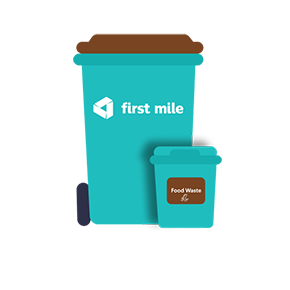Chuck it in
Please leave out
How to dispose of compostable packaging
Products made from organic material can be a nuisance in the wrong recycling service, but gold-dust in our Compostables Packaging Recycling sacks.
Compostables don't belong in your Mixed Recycling bags because they contaminate other materials and clog up the machines. But they also can't be disposed of with your Food Waste because food and compostables use very different processes to decompose.
Recycling your Compostables with First Mile
Use our dedicated Compostable Packaging Recycling bags to give the land a special treat.
Got a smaller quantity to recycle? Check out our Return and Recycle scheme for compostable packaging.
Why set up a Compostables Packaging Recycling collection with First Mile?
Compostables vs Biodegradables, what's the difference?
Compostable packaging must be certified. It proves the material decomposes completely in up to 180 days, leaving no toxics or residues behind. They are made of renewable resources and, once they break down, can be used as fertiliser.
Biodegradable packaging is made of petrochemicals modified to break down quickly by microorganisms, but it doesn’t specify a timeframe for decomposition or the conditions needed. Unsurprisingly, biodegradables often end up in landfills where they can take years to break down, releasing toxic gases. And, once they do break down, we're left with microplastics that harm the soil and can reach the ocean.







